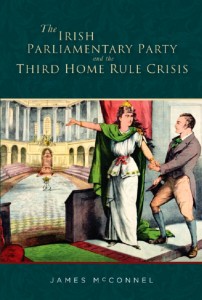THE IRISH PARLIAMENTARY PARTY AND THE THIRD HOME RULE CRISIS
Published in Issue 5 (September/October 2015), Reviews, Volume 23 This is an important book, which bypasses polemics for and against the Irish Parliamentary Party (IPP) under John Redmond’s leadership from 1900 to 1915, before the Rising. The focus is the party’s MPs, not the leadership.
This is an important book, which bypasses polemics for and against the Irish Parliamentary Party (IPP) under John Redmond’s leadership from 1900 to 1915, before the Rising. The focus is the party’s MPs, not the leadership.
Alexis de Tocqueville in The Ancien Régime and the Revolution underlined a surprising continuity in institutions and political culture before and after the upheavals of the French Revolution. James McConnel essentially makes the same point about Irish parliamentarians before and after independence.
It is an article of faith that the source of TDs’ concentration on local concerns, a.k.a. clientelism, is the multi-seat proportional representation system, and the consequent fierce local competition between TDs of the same and different parties. What McConnel demonstrates is that constituency brokerage was part of the IPP’s legacy to independent Ireland.
There is a marvellous vignette at the conclusion. After independence, J.P. Boland, Nationalist South Kerry MP from 1900 to 1918, had an initially awkward first meeting with his nervous future son-in-law, Fianna Fáil Kerry TD Fred Crowley, until discussion moved on to efforts to get a particular road built and the bridge to Valentia Island. A daughter, Bridget Boland, recalled: ‘They were off, roads and bridges and schools and local industries—it was the well-being of the Kerrymen that was really all either of them cared about’.
The ‘trivial’ and ‘parochial’ concerns raised by Irish MPs in the imperial parliament in ‘excessive’ questions about such matters as land purchase, drainage, piers and (post-1909) old age pensions drove patrician Conservative leader Arthur Balfour to complain that this was ‘a system of petty annoyance by which the Irish hope to make themselves so eminently disagreeable to the rest of the House that we shall be glad to get rid of them, even at the price of Home Rule’. Irish MPs were in turn being asked by constituency groups to put down questions in the House—for ex-ample, one in 1911 by William Duffy MP about the drainage of rivers in South Galway. James O’Mara, MP for South Kilkenny, was requested by a priest to ask about the trespass of a cow onto a woman’s land. Putting down a question ‘could provide tangible evidence of an MP’s efforts on behalf of his constituents’, given their absence at a distance, though some came back nearly every weekend by boat and train, a journey that took nine hours to Dublin.
There were familiar ongoing tensions between the party at local level and the leadership over candidate selection at convention. Redmond did not have the same control as Parnell. Although the IPP eschewed place-hunting for itself, and despite some leadership disapproval, MPs lobbied for government appointments for their supporters, often defended as favouring previously under-represented Catholic appointees.
Popular history exaggerates the contrast between the Fenian and constitutional nationalist traditions. A number of Nationalist MPs had been Fenians in their youth or involved in their campaigns. The IPP even liked to present themselves as the true heirs to the Fenians. The IPP saw off easily the initial Sinn Féin challenge in 1907–8. MPs often acted as patrons for GAA clubs. They had a reasonably constructive relationship with the Gaelic League and the Irish-language movement, and Pearse was conciliatory rather than confrontational. They sat on the fence during the 1913 lockout.
MPs often led a lonely and monotonous life in London. With few exceptions, they avoided the embrace of high society. Some participated in parliamentary golf outings. In 1912–14, backbench parliamentary contributions that might assist the Tories to delay Home Rule were discouraged. Party discipline and attendance levels were high. They lost public support, however, through taking parliamentary salaries and being too supportive of the Liberal government. Constituents missed the strong attacks of earlier years, and wanted more focus on local concerns.
Home Rule initially had credibility. One reason for founding the Labour Party in 1912, as far as James Connolly was concerned, was to provide an opposition in the anticipated Home Rule parliament. Arthur Griffith thought in similar terms. According to McConnel, even Pearse may have contemplated standing. The IPP leadership was concerned, however, about the cost implications of the emerging welfare state.
There were divided attitudes towards the empire. A key criticism of Redmond is that he allowed empire loyalty to become a means of securing Home Rule rather than a reward after it was granted. Few of his MPs were active in encouraging enlistment.
It is little known that the IPP imported arms for the Volunteers in 1914 after the Howth gunrunning. They saw the Volunteers as insurance against a Tory government revoking Home Rule. The IPP’s alternative to the exclusion of the major part of Ulster was Home Rule within Home Rule, but like their political successors they found it easier to take refuge in denial to avoid upsetting their Northern supporters. For the IPP, and not just the Asquith government, the outbreak of the First World War, which saw Home Rule, theoretically for 32 counties, enacted but put on ice, provided temporary relief.
There is still an internal history to be written about the party’s collapse. Their explanation of the Rising as a coup against the party is implausible and not argued by the author.
















